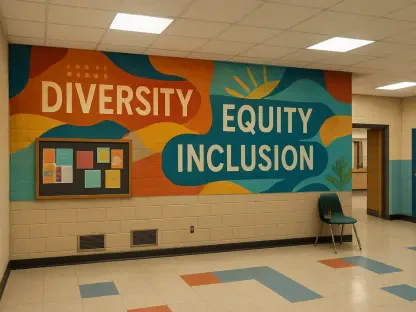Imagine a classroom where every student learns at a pace and style tailored specifically to their needs, guided by technology that adapts in real time to their progress, while teachers use data-driven insights to enhance learning. Artificial intelligence (AI) is turning this vision into reality, offering tools that personalize education, streamline assessments, and empower teachers with valuable information. Yet, the transformative potential of AI in schools comes with a critical caveat: it must remain human-centered, prioritizing the values and connections that define education. This can only be achieved if teachers are equipped with the knowledge and skills to navigate AI responsibly. Without adequate literacy in AI, the integration of these technologies risks becoming a hollow exercise, detached from the human elements that make learning meaningful. This article delves into the pivotal role of teacher AI literacy in ensuring that AI enhances education while safeguarding its core principles of equity, ethics, and personal engagement.
Harnessing AI’s Transformative Potential in Schools
The integration of AI into education is already reshaping how students learn and teachers instruct, with platforms like Duolingo and Quizlet leading the charge. These tools leverage adaptive algorithms to create individualized learning pathways, responding to each student’s strengths and weaknesses with real-time feedback. Such personalization keeps learners engaged by offering diverse experiences that traditional methods often struggle to provide. Beyond student engagement, AI supports educators by automating routine tasks like grading and lesson planning, freeing up time for more meaningful interactions. However, for these benefits to be fully realized, teachers must understand how AI operates and recognize its limitations. Without this foundation, there’s a risk of over-reliance on technology, potentially diminishing the teacher’s role as a mentor and guide. The promise of AI in education, therefore, rests on educators’ ability to use it as a tool to amplify, not replace, their expertise in fostering student growth.
AI’s potential extends beyond personalization to revolutionize decision-making in education through data-driven insights. By analyzing vast amounts of student data, AI can help identify learning gaps, predict outcomes, and suggest targeted interventions, enabling teachers to address individual needs more effectively. This capability is particularly powerful in creating equitable learning environments, where students from diverse backgrounds receive the support they need to thrive. Yet, the effectiveness of these tools depends on teachers’ ability to interpret and act on the data provided. Misunderstanding or misapplying AI-generated insights could lead to misguided strategies that fail to serve students’ best interests. Thus, a deep comprehension of AI’s mechanisms is essential for educators to harness its power responsibly, ensuring that technology serves as a partner in crafting inclusive and impactful educational experiences rather than a barrier to genuine progress.
The Imperative of AI Literacy Among Educators
AI literacy for teachers is not merely about mastering tech tools but involves a comprehensive understanding of foundational concepts such as algorithms, data usage, and ethical implications. As emphasized by global frameworks like those from UNESCO, this literacy entails assessing both the advantages and risks of AI in educational settings, applying it to lesson design, and ensuring alignment with curriculum objectives. Teachers must be able to critically evaluate AI systems to avoid biases that could perpetuate inequity among students. Continuous professional development plays a crucial role in building and sustaining these skills, enabling educators to adapt to rapidly evolving technologies. Without such training, the adoption of AI in classrooms could become inconsistent, lacking the strategic focus needed to enhance teaching. Equipping teachers with this knowledge ensures that AI integration remains purposeful and aligned with educational priorities.
Beyond technical know-how, AI literacy empowers teachers to maintain their central role in the learning process amidst technological advancements. It enables them to make informed decisions about when and how to use AI tools, ensuring that technology complements rather than overshadows human interaction. For instance, understanding how AI personalizes learning allows educators to balance digital interventions with personal guidance, preserving the empathetic connections that are vital to student development. Additionally, literacy in AI helps teachers navigate the complexities of integrating these tools into existing teaching practices without disrupting the classroom dynamic. A lack of such understanding could result in a disconnect between technology and teaching goals, undermining student engagement. Therefore, fostering AI literacy is essential to empower educators as active shapers of tech-driven education, ensuring they retain control over how AI influences learning environments.
Prioritizing Ethics for a Human-First Approach
Integrating AI into education demands a steadfast commitment to ethical standards, ensuring that technology upholds the human-centered values at the heart of learning. Concerns such as student privacy and data security are paramount, requiring educators and school systems to adhere to rigorous guidelines like Australia’s AI ethical principles. Teachers must remain vigilant about potential data breaches and prioritize safeguarding sensitive information over the convenience of tech solutions. This responsibility extends to fostering an environment where students feel secure in their digital interactions, knowing their personal details are protected. Without a strong ethical framework, AI risks becoming a source of harm rather than a benefit, eroding trust in educational institutions. A human-first approach, guided by ethical considerations, ensures that technology enhances rather than undermines the personal connections that define effective teaching.
Moreover, a human-centered focus in AI integration means ensuring that technology serves as a tool to support, not supplant, the teacher-student relationship. Ethical literacy equips educators to critically assess AI tools for biases or unintended consequences that could impact fairness in the classroom. For example, algorithms that inadvertently favor certain demographics over others must be identified and addressed to maintain equity. Teachers play a pivotal role in modeling responsible AI use for students, teaching them to question and evaluate digital outputs rather than accept them at face value. Neglecting these ethical dimensions could lead to a dehumanized educational experience, where technology dictates outcomes without regard for individual needs. By prioritizing ethics, educators can ensure that AI amplifies human values, fostering an environment of trust, inclusivity, and genuine learning that respects the unique needs of every student.
Innovating Teaching and Assessment Through AI Skills
AI literacy opens doors to innovative teaching practices, such as the AI-Pedagogy framework, which guides educators in selecting tools that align with curriculum standards and student needs. This approach encourages fostering critical and creative thinking by integrating AI into both individual and collaborative tasks, ensuring students develop essential skills for the future. Teachers skilled in AI can craft effective prompts and guide students in evaluating AI-generated content, promoting digital discernment. Such practices not only enhance engagement but also prepare students to navigate a tech-driven world responsibly. However, without the necessary literacy, educators might struggle to integrate these tools meaningfully, resulting in missed opportunities to enrich learning. Building these skills ensures that AI becomes a catalyst for innovative pedagogy, tailored to diverse classroom dynamics and learning objectives.
AI also transforms assessment through methods like Immersive Assessment, where students engage with tasks and receive immediate feedback powered by technology. Coupled with data literacy, teachers can use AI to analyze student performance through digital dashboards and develop Individual Digital Learning Histories to track progress over time. These tools offer insights into learning trends, enabling educators to adjust strategies to meet specific needs and promote student agency. Yet, the success of such innovations hinges on teachers’ ability to interpret data accurately and apply it effectively within their teaching context. A lack of proficiency could lead to misinformed decisions that hinder rather than help student growth. By mastering AI and data skills, educators can leverage these advancements to create personalized, responsive assessment practices that empower students to take ownership of their learning journey.
Shaping the Future of Education with Responsible AI Use
Reflecting on the journey of AI in education, it’s evident that past efforts to integrate technology often stumbled when human elements were overlooked. Teachers who embraced early AI tools without adequate training sometimes faced challenges in maintaining student engagement or ensuring fairness. However, those who prioritized literacy and ethical considerations saw technology enhance their ability to connect with students on a deeper level. Looking back, successful implementations often stemmed from a commitment to ongoing professional development, which equipped educators with the tools to adapt AI to their unique classroom needs. These lessons from history underscore that human-centered education thrived when technology was guided by informed, ethical hands.
Moving forward, the focus must shift to actionable strategies that embed AI literacy into teacher training programs across all levels. Schools and policymakers should invest in robust professional development initiatives, ensuring educators have access to resources and support to master AI tools responsibly. Partnerships with tech experts can help demystify complex concepts, while collaborative platforms can enable teachers to share best practices for ethical AI use. Emphasizing data security and student privacy in these programs will further safeguard trust in educational systems. By taking these steps, the education sector can build a future where AI not only personalizes learning but also upholds the human values that make education transformative, ensuring every student benefits from technology’s potential in a safe, inclusive environment.









